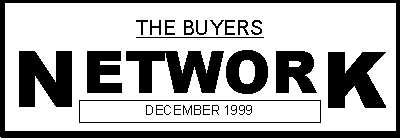

The Buyers Network is Published
Monthly by the Purchasing Division of the West
Virginia Department of Administration to Promote Better Value in Public Purchasing
Welcome to the December 1999 Issue of the The Buyers Network!
Articles in this Issue:
1999 Fiscal Year Accomplishments Outlined in Division's Annual Report
Director's Comments: Lelarning More About the Marketplace
Keeping Up with Market Trends: What's New in Lighting?
MoneyWise...Tips for the Thrifty
Clarification on Equipment Trade-in's Offered to Agencies
State Parking Building Opens...
Welcoming State Employees and Visitors
Current Statewide Contract Update
1999 Fiscal Year
Accomplishments
Outlined in Division's Annual Report
In order to document the accomplishments achieved during fiscal year 1999, the Purchasing Division decided to produce its first Annual Report, which soon will be distributed to Governor Cecil H. Underwood, members of the West Virginia Legislature and made available to the citizens of West Virginia.
The Annual Report highlights many of the accomplishments which the agency realized from July 1, 1998 through June 30, 1999. Below is an excerpt from this report:
GENERAL INITIATIVES
w
The first ever vendor purchasing conference held in May, 1999.
w A toll-free telephone number (1-800-BIDS2WV) for in-state vendors.
w West Virginia Purchasing Bulletin
w Online request for bid packages
w The Vendor Handbook, "The ABC’s of Doing Business with the State of West Virginia."
w Feedback from West Virginia vendors when reviewing contracts for renewal or rebid.
w The Vendor Resource Center of the Purchasing Division’s Internet Website.
State Purchasing Card Program
During this fiscal year, the Purchasing Card Program has resulted in nearly $5 million
a month in small dollar transactions by agency personnel.
Training Programs
Several different types of training sessions were offered to vendors, agency
procurement officers and support staff, and all state employees targeting the Purchasing
Card Program, PO Encumbrance Module, TEAM purchasing system, and fixed assets.
ACQUISITIONS & CONTRACT ADMINISTRATION
Change in Purchasing Levels
The dollar threshold for non-competitive bids increased from $500 to $1,000, effective
July 1, 1998. This change affected the Purchasing Card Program, adjusting its limits
accordingly.
Implementation of Best Value Purchasing
The Purchasing Division adopted a more practical philosophy, resulting in more
expedient and cost-effective acquisitions. This process selects the offer which is most
advantageous to the state based on comparing and evaluating all pertinent factors in
addition to cost, so that the overall combination that best serves the state’s
interest is chosen. Several changes were made to the Request for Proposal process
including reducing the steps from two to one (technical and costs proposals are now opened
at the same time); eliminating the "written technical score" and the
"notice of intent to award"; increasing the dollar value of RFP projects from
$100,000 to $250,000; creating a standard format for all RFP projects; requiring
individual agency training and Purchasing Division approval for the evaluation committee
members; and changes to the vendor protests process.
Equipment Contract Orders
The Equipment Contract Order requirement on all statewide contracts was removed with
the exception of vehicles.
New Statewide Contracts
Five new statewide contracts were created during the fiscal year, including car
rental, electronic document management system, office supplies, Microsoft software and
travel mate portable facilities.
Purchasing Card Stipulation on Statewide Contracts
A stipulation on statewide contracts requires that vendors accept the State Purchasing
Card for qualifying purchases as a condition of award.
ADMINISTRATIVE SERVICES
Automation Unit
Website Enhancements [www.state.wv.us/admin/purchase]: The Purchasing Division has
enhanced its website to provide more valuable information to state agencies, businesses
and to the general public.
Administration Unit
Vendor Registration: A total of 9,063 Vendor Registration and Disclosure
Statement forms were processed during the fiscal year.
PO Encumbrance Module: All purchase orders with a fixed amount were placed in the West Virginia Financial Information Management System Purchase Order Encumbrance Module. A total of 5,621 purchase orders were entered, including purchase orders executed by the Purchasing Division and Higher Education.
Fixed Assets: The value of assets in the WVFIMS Fixed Assets System as of the end of the 1999 fiscal year was $740,221,827.85.
Travel Management Office
Car Rental Statewide Contract: In 1998, with the new statewide contract with
Avis, the average cost of car rental dropped from $48.56 to $40.18. Based on a total of
7,303 car days, the state saved $61,199.4.
Travel Regulations: The State Travel Regulations were revised to adopt the federal per-diem rate for meals.
Fleet Management Office
Overall Service: This program provided overall management services for
approximately 1,400 vehicles and ensured that the vehicles were appropriate to the
transportation needs of the users by coordinating with state agencies.
Vehicle Purchases: During model year 1999, approximately 240 vehicles were purchased through the Fleet Management Program to be leased to state agencies. The total amount spent on this year’s vehicle order was $4,382,378.83.
PHH Card Reduction: The PHH Credit Card fee was reduced from $2.50 per card each month to $.80, resulting in an estimated savings of $30,000 annually. PHH is the contractor for vehicle maintenance services to the state.
Vehicle Authorization: Authorization to state agencies for accident reporting was delegated, allowing for more timely vehicle repairs.
Surplus Property Unit
State Surplus Property Program: Sales for the State Surplus Property Program
totaled $2,747,642 for the 1999 fiscal year, which included a Division of Public Safety
helicopter sold at $1 million ($990,000 was reimbursed to the agency).
Federal Surplus Property Program: The total amount acquired through sales was $270,856.
U.S. General Services Administration Bi-Annual Review: Representatives of the U.S. General Services Administration conducted its bi-annual review of the Federal Surplus Property Program in West Virginia. Based on its findings, GSA recommended that the WV Surplus Property operation be reviewed every four years in leiu of every two. West Virginia is the only state in the mid-Atlantic region with this distinction.
Hopemont Public Auction: An on-site auction was held at Hopemont State Hospital in Preston County on August 8, 1998.
Capitol Parking Unit
Preparation of the State Parking Building: This office successfully relocated
250 parking patrons from the Division of Motor Vehicles parking lot in preparation of the
construction of the State Parking Building. On October 25, 1999, the parking building
opened, accommodating 788 parking patrons, including state employees and visitors.
OPERATIONS SECTION
Consolidated Publishing Facility
Quick Copy Convenience Centers: Four quick copy convenience centers, located in
Charleston, Kanawha City, and Nitro, provide digital duplication services for state
agencies and political subdivisions.
Offset Print Consolidation: In August of 1998, an agreement between the Department of Administration and the Division of Corrections resulted in the consolidation of two state printing resources. For years, two separate print shops, CPF, and Prison Industries, competed for state business. Two high-volume printing presses and 20 employees from the offset print unit was transferred from CPF to Prison Industries.
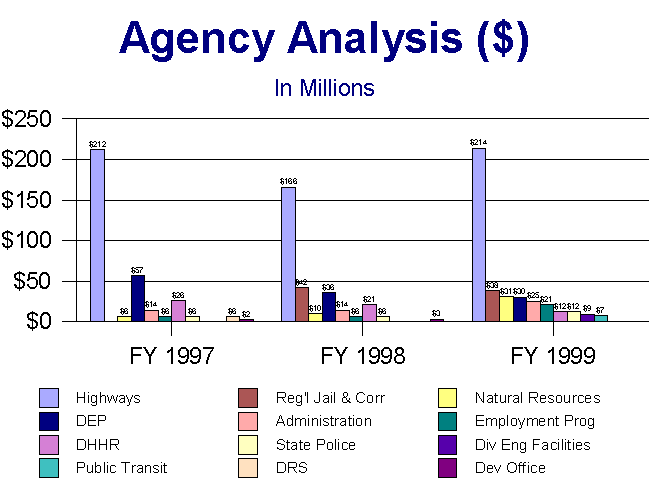
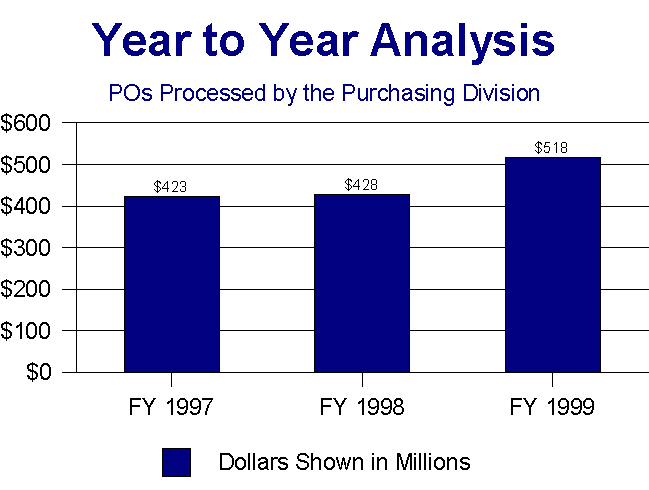
By Dave Tincher
State Purchasing Director
 As
in any profession, it is important to keep updated on activities and changes within any
industry. If you are a doctor, you must continue to learn of changes in the medical field.
If you are an attorney, you must follow changes in the law to perform your job
accordingly.
As
in any profession, it is important to keep updated on activities and changes within any
industry. If you are a doctor, you must continue to learn of changes in the medical field.
If you are an attorney, you must follow changes in the law to perform your job
accordingly.
The same is true for public purchasers. Effective procurement officers must follow market trends and learn about alternative purchasing methods which may prove more productive.
Several procurement officers within West Virginia state government have joined national associations that relate to public purchasing, including the National Association of State Purchasing Officials (NASPO) or the National Institute of Governmental Purchasing (NIGP). These organizations provide literature which addresses changes in the purchasing field.
There are also many trade magazines which focus on public purchasing. Articles focusing on the purchase of various commodities and services which are common to agency purchasers.
In this issue of The Buyers Network, we have included an article on market trends for lighting products (see below). This type of information better informs those individuals who have responsibility to seek the ‘best buy’ using tax dollars. As it has been stated on numerous occasions, learning must be a continuous process due to the everchanging markets of commodities and services.
Keeping
Up with Market Trends...
In attempt to provide energy-efficient lighting, compact fluorescent lighting, known as CFL, is replacing incandescent lighting, according to the Public Purchaser, a publication by the National Institute of Governmental Purchasing. The numbers say it all: CFLs can save 50 to 80 percent in energy costs over incandescent and lasts 8 to 10 times longer without losing lighting quality.
Not surprisingly, global sales of CFLs rose from 45 million units a year in 1988 to 356 million in 1997. Manufacturers are adding new CFL products.
Because workspaces were once horizontal, flat desks and tables, they did not reflect glare from bright light above. Enter computers and verticality. Their users are bothered by direct glare from overhead fixtures and indirect glare from light bouncing off computer monitors. One way to minimize glare problems is to use parabolic louvers. Molded of polystyrene or acrylic, the louvers fit over existing fixtures and redirect light downward out of the visual discomfort zone. Mead-Hatcher, a manufacturer of the devices, notes that the louvers conceal the lamps above and direct the light into a designated area.
Hewlett-Packard has developed a series of 5mm LED lamps designed for full-color video outdoor signs and for single-color information signs. These lamps feature smooth, matched radiation patterns, ensuring a consistent color mix in full-color applications and message uniformity across the viewing angle of the sign.
(Source: The Public Purchaser published by the National Institute of Governmental Purchasing, Inc. [NIGP])
Savings Money with Coupons
According to the Frugal Gazette, smart coupon clipping can save a family 20 to 30 percent of their grocery bill. Check coupons you have saved against items that are on sale this week at the supermarket.
Editor Cindy McIntyre says the sale price less the coupon gives you the items for next to nothing.
In the recently revised Inventory Management and Surplus Property Disposition handbook, the guidelines pertaining to trade-in of equipment were modified to offer clearer instructions in handling these transactions, according to Jo Ann Dunlap, Administration Unit Manager. Below is the updated information:
Occasionally, agencies may request to exchange existing equipment on a 'trade-in' basis when purchasing new equipment. If the value of the new equipment is less than $10,000, and the original cost of the proposed trade-in item is more than $1,000, the buying agency must submit a WVFIMS cover sheet to Surplus Property requesting authorization to trade in a piece of equipment on the purchase. In addition to the cover sheet, three written bids supplied by vendors must also be attached.
If approved by Surplus Property, this approval will be electronically transmitted to the agency via the WVFIMS Fixed Assets system. Upon receipt by Surplus Property of an awarded purchase order produced by the agency, Surplus Property will remove the items from the agency's inventory. If the original cost of the item to be traded is less than $1,000, and is not listed on the WVFIMS Fixed Asset system, a WV-103 retirement form can be sent to Surplus Property in lieu of the WVFIMS cover sheet.
If the value of the items to be purchased is greater than $10,000, a copy of the requisition which was submitted to the Acquisition and Contract Administration Section of the Purchasing Division should be forwarded to Surplus Property along with the proper form requesting the equipment to be used as a trade-in. If the trade-in is approved, Surplus Property will forward a signed copy of the WV-103 or WVFIMS cover sheet to the buyer who will award the purchase order. Upon receipt by Surplus Property of this awarded purchase order from the agency requesting the trade-in, Surplus will remove the item from the agency's inventory.
When soliciting bids, prices must be requested both with and without trade-in costs from the vendor(s) to facilitate an accurate comparison by Surplus Property, and also to establish a value for the new equipment for inventory purposes.
It is important to not that the value of the new equipment without consider-ation of the trade-in allowance is the value to be used for determining the purchase process and also the value to be reflected on the agency's fixed asset inventory. A trade-in allowance does not allow a state agency to alter or circumvent the purchasing process.
Only one-for-one trade-in will be considered, and items may be traded only for the same type of item. Trade-ins will not be authorized for items purchased from statewide contracts.
Top Tips for Preparing for the MillenniumWhen the calendar turns January 1, 2000, most people will not experience any problems; however, it is always best to be prepared. Below are some tips to help prevent potential problems with the arrival of the new millennium:
§
Pay by check. Be prepared to prove payments that you have made in the event of a dispute.§
Pay early. There's a better chance that payments will be recorded properly.§
Get prescriptions refilled well before Jan. 1. By the time you need another refill, any problem at the pharmacy will be resolved.§
Stash a little cash. Have it on hand so you can avoid a crowd of panicky people at the ATM.§
Get a current credit report. Try Equifax at www.equifax.com§
Get paper receipts, especially if you bank online.§
Follow up. After the first of the year, check your credit, bank and utility statements.
During Business Travel
Worries about what is happening back in the office should not distract you when traveling for business. Here are a few tips for keeping up and avoiding an overwhelming backlog of tasks when you return:
§
Empower your people. Train your staff to answer questions, make decisions, and carry out key tasks when you are gone. Start by letting them make decisions while you are just temporarily away from your desk.§
Ask for daily updates. You do not want a constant stream of messages throughout the day, but you should monitor what is going on. Designate someone to call you at the end of each day with a quick progress report.§ Use technology. Cell phones, pages, e-mail, electronic datebooks, and all sorts of technological tools can help you stay in touch and manage your time more effectively.
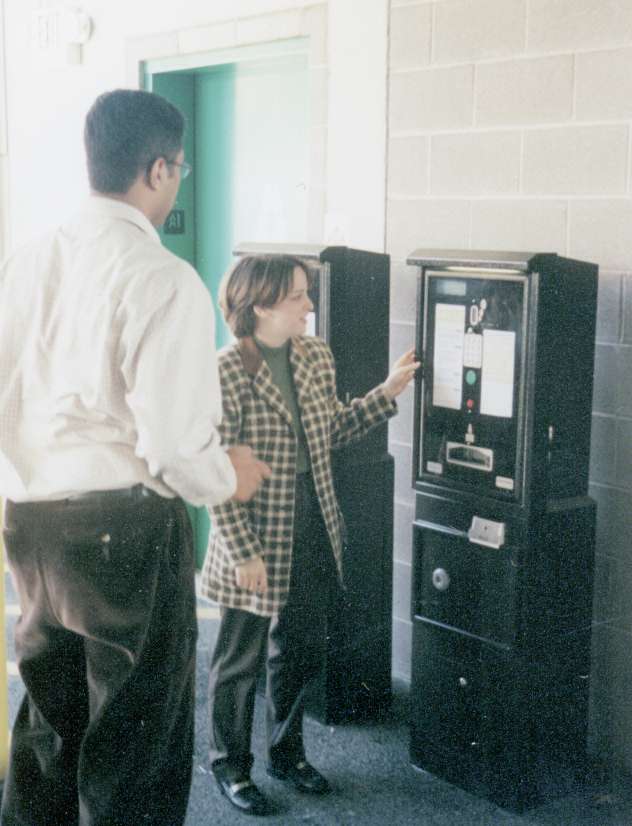
The machines have been installed for visitor parking in the first of the four locations at the Capitol Complex. They will be replacing nearly 200 parking meters. According to Cabinet Secretary Joseph Markus of the Department of Administration, safety and the economy were driving forces in converting to this new system.
How does the pay-by-space machines work: Each space at a parking area is numbered. When a visitor parks his car, he will go to the centrally located machine and indicate the numbered space, how long he plans to be parked in that space, enter the appropriate amount of money for that parking term, and take his receipt. The parking attendants will continue to monitor the spaces in that area to determine if any vehicles have expired their time. Parking tickets will be issued for all expired vehicles.
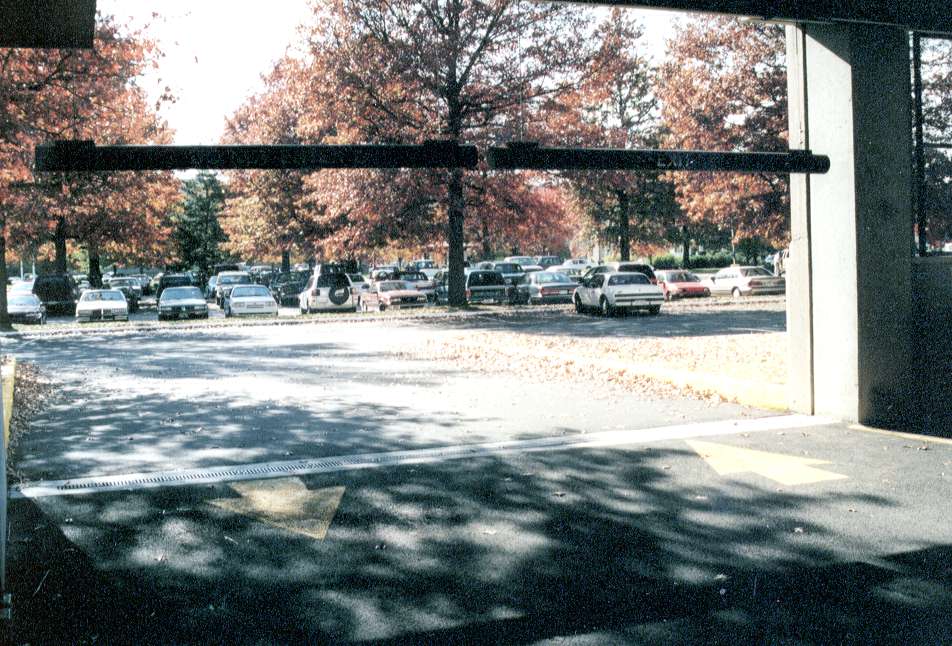
n
DHHR's Wheels to Work Program: A request for proposal for DHHR’s program, "Wheels to Work" is currently out for bid. This program provides transportation to TANF recipients in order to offer better access to the workforce.
n
Statewide Motor Vehicles Contract: The statewide contract for motor vehicles was awarded to the following vendors: Astorg Ford, Denbigh-Garrett Ford, Country Club Chrysler, Chenoweth Ford, Stevens Auto Center, Matheny Truck, R.H. Peters, Marion County Auto Sales (compressed natural gas vehicles only).n
Statewide Police Cruisers Contract: The statewide contract for police cruisers was awarded to the following vendors: Stevens Auto Center and Dutch Miller.n
New Statewide Digital Copy Machine Contract: The bid opening for a new statewide contract for digital copy machines was opened on November 24. All bids are currently being evaluated.
n
Surplus Property Auction: The West Virginia State Agency for Surplus Property will conduct its last public auction for the year on December 11, 1999. For more details, call (304) 766-2626.
Current Statewide Contract Update
Information and dates (as of November 15, 1999) included in this Current Statewide Contract Update are subject to change. If you need additional information, please contact the appropriate state buyer.
Contracts Awarded
Contract:
DISKETTEContract:
MVContract:
PCContracts to be Bid or Under Evaluation
Contract:
DICTContract:
CARPETContract: IP
Description: Information Processing
File: 21
Bid Opening: 08/11/99
Under Evaluation: Yes
Contract: PHOTO
Description: Photography Film and Supplies
File: 31
Bid Opening: 11/30/99
Under Evaluation: Yes
Contracts to be Renewed
Contract:
SANPAPContract:
AUDITContract:
IV/SOLContracts to be Reviewed
DECEMBER
IPTEMP
BEDDING
LIGHT
JANUARY
CONKITS
DFS
DATA
MSSW
CELTEL
Purchasing Division Staff
For questions concerning these contracts listed, please contact the appropriate buyer:
File 21
Charlyn Miller
(558-0067)
File 22
Pam Jones
(558-0468)
File 31
Evan Williams
(558-2596)
File 33
John Johnston
(558-0492)
File 41
Ron Price
(558-2316)
File 42
Jim Jackson
(558-2402)
Are you unsure of certain purchasing
procedures? ... Do you need to know what printing services Consolidated Publishing
Facility provides? ... Do you have a question regarding travel requests? ... Would you
want to know what surplus property is available? ... If you need information concerning
any function within the Purchasing Division, complete the form below:
Thank You for Viewing our December Issue of The Buyers Network